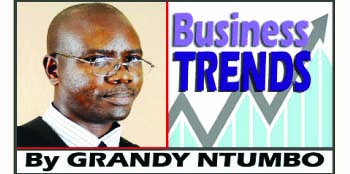 THE Association of Chartered Certified Accountants (ACCA) last Friday hosted a colorful reception for new and fellow members at Taj Pamodzi Hotel in Lusaka.
THE Association of Chartered Certified Accountants (ACCA) last Friday hosted a colorful reception for new and fellow members at Taj Pamodzi Hotel in Lusaka.
This event has been held annually since June 2011 to celebrate ACCA members’ achievements, and to welcome new and fellow members.
It was certainly a special event for many Zambian accounting professionals. For me it was special for three reasons:
I was being welcomed as a fellow member of the accounting profession, secondly it was being graced by two accomplished dignitaries and professionals that I have always wanted to cross paths with — Commerce Minister Margaret Mwanakatwe and ACCA global president, Alexandra Chin.
Thirdly, it coincided with a moment in time when I have been pondering on how the accounting profession has evolved globally and locally, the value proposition that accountants add to business and our national economy at large.
The accounting profession is as critical and significant as any other noble profession like medicine, engineering or legal.
The role that one plays in life should be treated as a question of asset specificity: A specialised asset, including a developed human capital asset that can only be used for one purpose at the opportunity cost of another purpose.
Traditionally, the world has looked at accountants as performers of repetitive tasks of number crunching, counting, comparing, recording, and reporting financial information.
However, the world has dramatically changed in every aspect, politically, socially, economically and so has the business climate.
Today’s business has become more complex and competitive than ever before, with mergers and acquisitions occurring more frequently and virtual companies springing up.
Additionally, issues of globalisation and internationalisation of business, technology doubling every less than 18 months, have exacerbated the scenario.
Over the years, accountants have been prepared to change the types of tasks they perform, acquired the necessary knowledge and skills to function as fully-fledged business partners.
More than ever before, professional accountants are increasingly expected to play the role of becoming business partners and change agents.
Computer technology and intense business competition are compelling this change in role from transaction processor to business partner.
With the ever stiffening competition, businesses have responded by emphasising two new priorities, improving the quality of products and services and increasing productivity.
Many companies have adopted the concept of re-engineering to achieve these priorities.
The accounting profession too has matched the above challenge and has changed from the traditional number crunching task to be active participants, agents in organisational change and design processes.
As finance leaders, accountants now participate in the strategy setting processes and evaluating the effect of each and every given strategy on business in terms of financial outcomes.
We are living in an age when the business World feels intense pressure to hit revenue targets, survive the competition, grow and prosper.
More than ever before, global economies experience turbulence and the need to find sustainable solutions.
As national economies and businesses strive to survive and prosper, there arises a dire need to perform a balancing act: Prosperity versus ethical conduct.
Additionally, we saw last week that the World Bank estimates reveal that the cost of corruption equals more than five percent of global GDP (US$2.6 trillion) with over US$1 trillion paid in bribes each year.
We also saw that the World Economic Forum estimates that corruption increases the cost of doing business by up to 10 per cent on average.
Following on, we also looked at the ethical dilemma that faces some corporate businesses which is consequently one of the identified causes of corruption in the business world.
This dilemma arises as corporate leaders seek to acquire lucrative business deals and face situations where they either have to forgo additional businesses and uphold ethical conduct or acquire such deals at the expense of ethical issues.
Money is the blood line of every business and therefore any flow of money is synonymous with a direct or indirect role of an accountant.
It is at this point that the accounting profession makes the difference and should significantly and increasingly contribute to the fighting corruption in order to foster meaningful business and economic growth.
The accounting fraternity has positioned itself in such a way that it encourages employers to employ professional accountants who are members of recognised regulatory bodies such as the Zambia Institute of Chartered Accountants (ZICA) and ACCA.
ZICA and ACCA for example do not entertain members who fail to abide by professional and ethical conduct.
As we have already alluded to, the accounting profession has dramatically evolved and stretched beyond the number crunching operations.
It is a critical profession that needs to be viewed as such by the public and employers.
It’s time for the world to increasingly awaken to the reality that professional accountants are strategic business partners, change agents and have a value proposition rather than being viewed as transaction processors.
Accountants can also increasingly contribute to economic development by overcoming the ethical dilemma that faces some of them as they carry out their professional work.
For comments e-mail: ntumbograndy@yahoo.com Mobile +260977403113 +260955403113
The author is the managing consultant at GN Grant Business Consultant, a fellow of the Association of Chartered Certified Accountants (ACCA), a Master of Business Administration (MBA) holder and a candidate for the Herriot Watt University (Scotland) Doctor of Business Administration (DBA)






